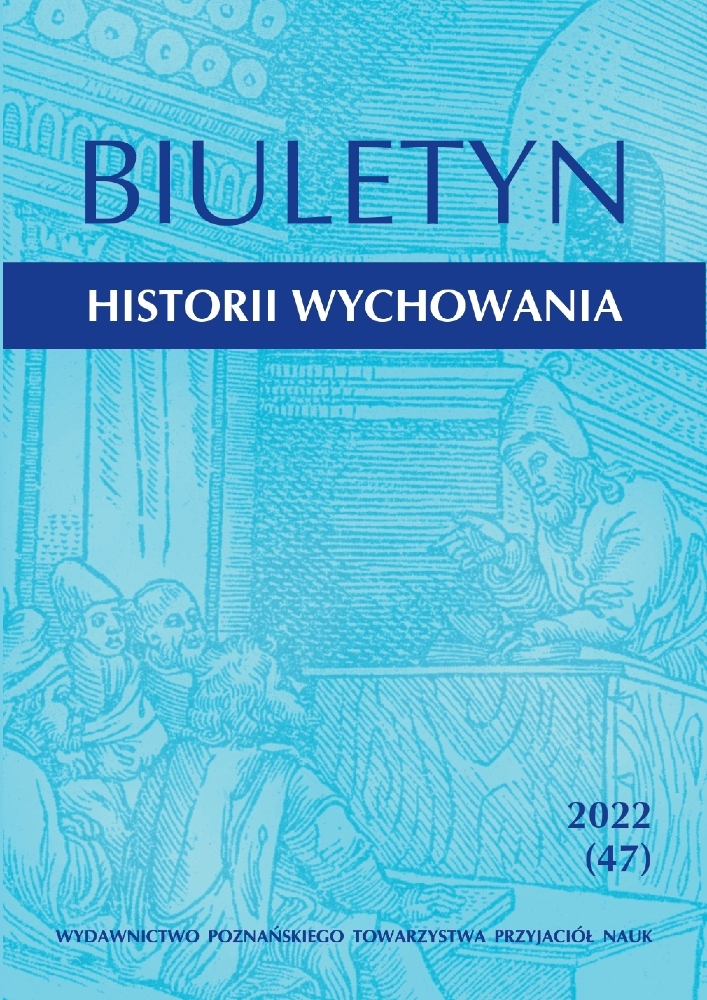Wychowawczy, edukacyjny i społeczny wymiar wileńskich cechów doby wczesnonowożytnej. Towarzysz w służbie mistrza i cechu
DOI:
https://doi.org/10.14746/bhw.2022.47.3Słowa kluczowe:
crafts, apprentice, Vilnius, guildsAbstrakt
In the following paper I would like to analyze educational, social and upbringing related dimensions of Vilnius guilds, employing apprentices. They not only worked but, participating in manufacturing of goods, they also prepared themselves for the profession. In this article, I take a look at the functioning of this group in the structures of guilds and workshops run by Vilnius craftsmen. The question arises what was expected of them as members of craft workshops and guilds. How the companions’ dependence on the master, for whom they worked, changed. In addition, there is an issue of the role of practice – the journey that had to be made in the case of some professions and the skills acquired in the process. The following research does not have an ambition of being a holistic study of the issue; it is a revision and a supplement to Józef Morzy’s research where he partly analyzed craft guilds in Vilnius, in terms of essential work skills. In order to explain these issues, the statutes of the craft guilds were analyzed in Vilnius, one of the biggest cities of the Polish–Lithuanian Commonwealth, in the early modern period.
Pobrania
Bibliografia
Akty cechów wileńskich 1495–1759 (dalej ACW), zebr. i przygot. do druku H. Łowmiański, przy współudziale M. Łowmiańskiej, S. Kościałkowskiego, przedmową i skorowidzami opatrzył J. Jurkiewicz, Poznań 2006.
Arłamowicz K., Dzieje przemyskich cechów rzemieślniczych w dawnej Polsce, Przemyśl 1931.
Bosshardt W., Lopus J.S., Business in the Middle Ages: What Was the Role of Guilds?, „Social Education” 2013, 77 (2), pp. 64–67.
Charewiczowa L., Lwowskie organizacje zawodowe za czasów Polski przedrozbiorowej, Lwów 1929.
Darnton R., Pracownicy podnoszą bunt: Wielka masakra kotów przy ulicy Saint-Séverin, w: R. Darnton, Wielka masakra kotów i inne epizody francuskiej historii kulturowej, tłum. D. Guzowska, Warszawa 2012, s. 93–126.
Doroszewski P.H., Cechy rzemieślnicze miast warmińskich w XVI–XVII wieku, w: Miasta polskie w średniowieczu i czasach nowożytnych, red. P. Gołdyn, Kraków 2008, s. 241–252.
Gadocha M., Cech piwowarów, karczmarzy i słodowników krakowskich w XVI–XVII wieku, w: Miasta polskie w średniowieczu i czasach nowożytnych, red. P. Gołdyn, Kraków 2008, s. 253–280.
Herbst S., Toruńskie cechy rzemieślnicze. Zarys przeszłości, Toruń 1933.
Horn M., Rzemiosło miejskie województwa bełskiego w pierwszej połowie XVII wieku. Zagadnienie kryzysu gospodarczego Rzeczypospolitej szlacheckiej w XVII wieku, Wrocław–Warszawa–Kraków 1966 .
Husak M., Pozycja prawna wdowy w prawie cechowym do połowy XVIII wieku w perspektywie archeologii prawnej na przykładzie miasta Prudnika na Górnym Śląsku, „Acta Universitatis Wratislaviensis. Prawo” 2015, t. 319, s. 119–140.
Karpiński A., Pauperes, o mieszkańcach Warszawy XVI i XVII wieku, Warszawa 1983.
Karpiński A., Kobieta w mieście polskim w drugiej połowie XVI i w XVII wieku, Warszawa 1995.
Kochowicz J., Sosnowska A., Historia gospodarcza Polski przedrozbiorowej – porzucone terytorium?, „Roczniki Dziejów Społecznych i Gospodarczych” 2011, t. 71, s. 7–32. DOI: https://doi.org/10.12775/RDSG.2011.01
Kowalski M., Bennett J.M., Crafts, Gilds, and women in the middle Ages: Fifty years after Marian K. Dale, „Journal of Women in Culture and Society” 1989, vol. 14, no. 2, s. 474–501. DOI: https://doi.org/10.1086/494517
Manyś B., Uczeń w szeregach rzemieślniczych. System edukacyjny i wychowawczy chłopców w wileńskich cechach w dobie wczesnonowożytnej w świetle statutów cechowych, „Biuletyn Historii Wychowania” 2019, 40, s. 7–23. DOI: https://doi.org/10.14746/bhw.2019.40.1
Morzy J., Geneza i rozwój cechów wileńskich do końca XVII w., „Zeszyty Uniwersytetu im. A. Mickiewicza. Historia” 1959, z. 4, s. 4–93.
Orzelska-Konarska B., Mistrzowie i czeladnicy. Pozycja społeczna czeladzi w cechach krakowskich w XVI–XVII wieku, Warszawa 1968 .
Pihan-Kijasowa A., Akty cechów wileńskich z lat 1495–1759. Komentarz językowy, w: W kręgu języka: materiały konferencji „Słowotwórstwo – słownictwo – polszczyzna kresowa” poświęconej pamięci profesor Zofii Kurzowej, Kraków 16–17 maja 2008, red. M. Skarżyński, M. Szpiczakowska, Biblioteka „LingVariów”, t. 2, Kraków 2009, s. 175–185.
Pihan-Kijasowa A., Wileński socjolekt rzemieślniczy XVI–XVIII wieku w świetle badań pogranicza językowego. Zarys problematyki, „Teka Komisji Polsko-Ukraińskiej Związków Kulturowych” 2020, t. 6, s. 237–250. DOI: https://doi.org/10.31743/teka.13364
Pihan-Kijasowa A., Wileńskie słownictwo rzemieślnicze XVI–XVIII wieku. Rekonesans badawczy, w: Językowe i kulturowe dziedzictwo Wielkiego Księstwa Litewskiego. Millenium Litwy 1009-2009, red. J. Mędelska, Z. Sawaniewska-Mochowa, Bydgoszcz 2010, s. 334–341.
Pozdro Z ., Uczniowie i towarzysze cechów krakowskich od drugiej połowy w. XIV do połowy w. XVII, Lwów 1900.
Surdacki M., Edukacja i opieka społeczna w Urzędowie XV–XVIII w., Lublin 2004.
Surdacki M., Edukacyjno-opiekuńcze funkcje cechów urzędowskich w XVI–XVIII wieku, „Rozprawy z Dziejów Oświaty” 2005, nr 44, s. 7–48.
Trzoska J ., Walka cechów gdańskich z partaczami w XVII–XVIII wieku, w: Mieszczaństwo gdańskie, red. S. Salmonowicz, Gdańsk 1997, s. 35–49
Pobrania
Opublikowane
Jak cytować
Numer
Dział
Licencja
Prawa autorskie (c) 2024 Bernadetta Manyś

Utwór dostępny jest na licencji Creative Commons Uznanie autorstwa – Użycie niekomercyjne – Bez utworów zależnych 4.0 Międzynarodowe.
Zgodne z normami prawa polskiego.









